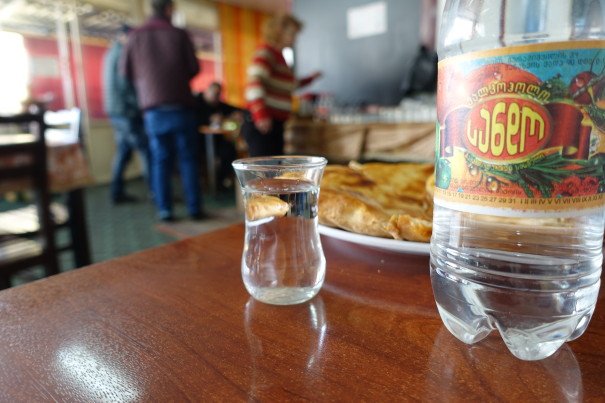
Seize the Chacha

Seize the Chacha
When Beso, the bearlike owner of Café Niko, a no-frills Georgian café seemingly built on stilts above the Caucasus-bound-bus station in Istanbul, delivered another round to the men huddled around tables on the terrace, the whole structure squeaked and shook. Per-haps accustomed to drinking on the long bumpy ride from Tbilisi, they carried on, un-fazed by the motion. If the drinks spilled a bit, nobody seemed to care.
I’d come searching for Euro Cafe, another Georgian restaurant, said to serve great dump-lings, for and by Georgians, a detail of authenticity that non-Turkish restaurants in Istan-bul lack, and expats like me crave. Euro Café was long gone, a Turkish büfe selling hot dogs and cigarettes in its place. Café Niko looked like the next best thing. It was the first day of Ramadan and hot, so I took a table inside by the fan. Aside from a TV blaring a Georgian variety show, a poster of fruit, and couple of small prayer cards depicting black-hooded saints, tucked into the frame of a line drawing of old Tbilisi, there was no decoration. Like a popup restaurant, Café Niko felt like it could be broken down, packed up and sent back to Georgia on the next bus.
Beso put on his glasses and read the macaroni-looking Georgian script on the menu: khinkali, lobio, khachapuri. I ordered some of each and gestured to the buffet filled with glasses and plastic bottles.
“Georgian vodka, homemade,” he said in English.
He took a bottle from the cooler, filled a slim-waisted Turkish tea glass with the clear liquid, and left the bottle the table. Had I silently bought the bottle? Or was there some honor system? I didn’t protest. This “vodka” was chacha, a homemade liquor I’d heard about but never tasted. Whenever the subject of Greek tsipouro or Bosnian rakija came up, someone always seemed to mention chacha, as if it were a notch on the moonshine drinker’s belt.
With moonshine, you never know exactly what’s in the bottle. I like to think that lack of regulation creates the possibility of discovering a truly excellent product: the grapes of a perfect harvest, distilled by a master working in the best conditions, decanted into anon-ymous plastic bottles.
I sipped this chacha slowly. The alcohol made its assault and I felt flushed immediately. Then, as I got accustomed to the shocking mechanics of the drink, its fruity taste and smell emphatically rushed forward—fresh, cold grapes. Without a point of reference, I couldn’t be sure how this chacha measured up against others, but it was certainly more enjoyable than similar drinks I’d had all over the Balkans. This was my new favorite in the category of grape-based homemade alcohol.
If Beso had been serving some outstanding Georgian wine, I could Google the name on the bottle and probably arrange to have a case shipped to my house. But when Beso’s jer-rycans were empty, it might be the last call for this particular chacha.
But the drinkers on the terrace of Café Niko were not stockpiling this vintage. They threw it back and ordered more and more, lit cigarettes, and played with a stun gun under the table—startling a beefy waitress in felt slippers and a black fanny pack. Maybe that was the lesson in chacha drinking—enjoy it while it’s here, and when it’s gone, don’t worry, there’s probably another batch, which could be even better, sloshing around on a bus headed in from Tbilisi.
But just to be safe, I bought an extra bottle to go.